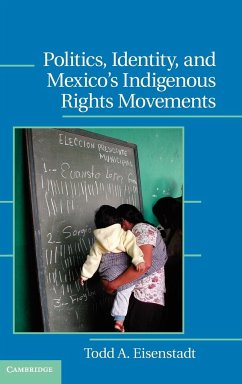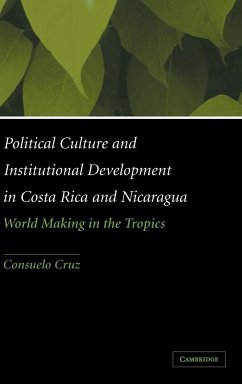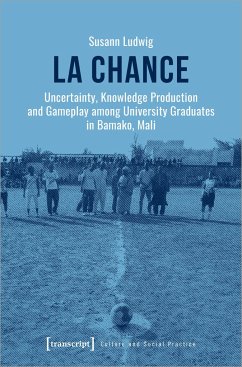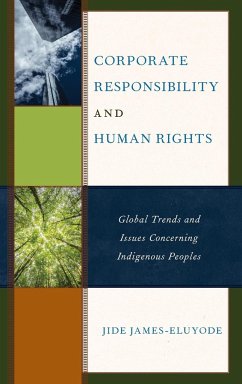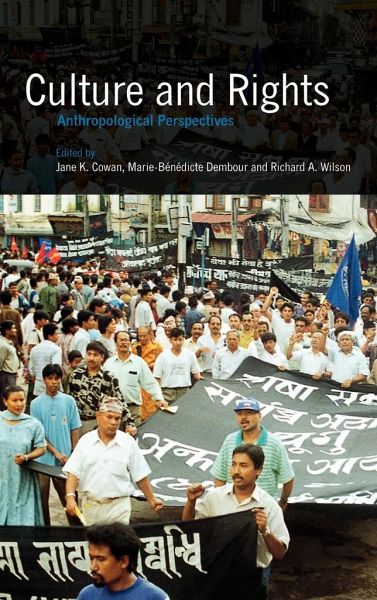
Culture and Rights
Anthropological Perspectives
Herausgeber: Dembour, Marie-Benedicte; Cowan, Jane K.; Wilson, Richard
Versandkostenfrei!
Versandfertig in 1-2 Wochen
78,99 €
inkl. MwSt.
Weitere Ausgaben:

PAYBACK Punkte
39 °P sammeln!
Do people everywhere have the same, or even compatible, ideas about multiculturalism, indigenous rights or women's rights? The authors of this book move beyond the traditional terms of the universalism versus cultural relativism debate. Through detailed case-studies from around the world (Hawaii, France, Thailand, Botswana, Greece, Nepal and Canada) they explore the concrete effects of rights talk and rights institutions on people's lives.Table of contents:1. Introduction; Part I. Setting Universal Rights: 2. Changing rights, changing culture Sally Engle Merry; 3. Following the movement of a p...
Do people everywhere have the same, or even compatible, ideas about multiculturalism, indigenous rights or women's rights? The authors of this book move beyond the traditional terms of the universalism versus cultural relativism debate. Through detailed case-studies from around the world (Hawaii, France, Thailand, Botswana, Greece, Nepal and Canada) they explore the concrete effects of rights talk and rights institutions on people's lives.
Table of contents:
1. Introduction; Part I. Setting Universal Rights: 2. Changing rights, changing culture Sally Engle Merry; 3. Following the movement of a pendulum: between universalism and relativism Marie-Bénédicte Dembour; 4. Imposing rights? - a case study of child prostitution in Thailand Heather Montgomery; 5. Gendering culture: towards a plural perspective of Kwena women's rights Anne Griffiths; 6. Between universalism and relativism: a critique of the UNESCO concept of culture Thomas Hylland Eriksen; Part II. Claiming Cultural Rights: 7. Ambiguities of an emancipatory discourse: The making of a Macedonian minority in Greece Jane K. Cowan; 8. From cultural rights to individual rights and back: Nepalese struggles over culture and identity David Gellner; 9. Advancing indigenous claims through the law: Reflections on the Guatemalan peace process Rachel Sieder and Jessica Witchell; 10. Rights as the reward for simulated cultural sameness: the Innu in the Canadian colonial context Colin Samson.
Do people in different parts of the world have the same, or even compatible, ideas about such matters as multiculturalism, indigenous rights, or women's rights? The authors of this book review the mainstream human rights literature, and reject both cultural relativism and a culture-free universalism.
Case studies which consider the relationship between universal human rights and particular societies.
Table of contents:
1. Introduction; Part I. Setting Universal Rights: 2. Changing rights, changing culture Sally Engle Merry; 3. Following the movement of a pendulum: between universalism and relativism Marie-Bénédicte Dembour; 4. Imposing rights? - a case study of child prostitution in Thailand Heather Montgomery; 5. Gendering culture: towards a plural perspective of Kwena women's rights Anne Griffiths; 6. Between universalism and relativism: a critique of the UNESCO concept of culture Thomas Hylland Eriksen; Part II. Claiming Cultural Rights: 7. Ambiguities of an emancipatory discourse: The making of a Macedonian minority in Greece Jane K. Cowan; 8. From cultural rights to individual rights and back: Nepalese struggles over culture and identity David Gellner; 9. Advancing indigenous claims through the law: Reflections on the Guatemalan peace process Rachel Sieder and Jessica Witchell; 10. Rights as the reward for simulated cultural sameness: the Innu in the Canadian colonial context Colin Samson.
Do people in different parts of the world have the same, or even compatible, ideas about such matters as multiculturalism, indigenous rights, or women's rights? The authors of this book review the mainstream human rights literature, and reject both cultural relativism and a culture-free universalism.
Case studies which consider the relationship between universal human rights and particular societies.





